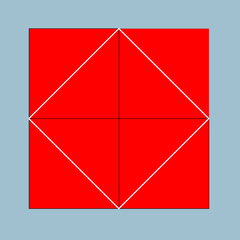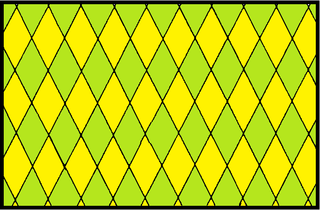Square tiling
| Square tiling | |
|---|---|
 | |
| Type | Regular tiling |
| Vertex configuration | 4.4.4.4 (or 44) |
| Schläfli symbol(s) | {4,4} |
| Wythoff symbol(s) | 4 | 2 4 |
| Coxeter diagram(s) | |
| Symmetry | p4m, [4,4], (*442) |
| Rotation symmetry | p4, [4,4]+, (442) |
| Dual | self-dual |
| Properties | Vertex-transitive, edge-transitive, face-transitive |
 4.4.4.4 (or 44) | |
In geometry, the square tiling or square grid is a regular tiling of the Euclidean plane. It has Schläfli symbol of {4,4}, meaning it has 4 squares around every vertex.
Conway calls it a quadrille.
The internal angle of the square is 90 degrees so four squares at a point make a full 360 degrees. It is one of three regular tilings of the plane. The other two are the triangular tiling and the hexagonal tiling.
Uniform colorings
There are 9 distinct uniform colorings of a square tiling, with 5 of them as kaleidoscopic constructions with corresponding Coxeter diagrams. (Naming the colors by indices on the 4 squares around a vertex: 1111, 1112(i), 1112(ii), 1122, 1123(i), 1123(ii), 1212, 1213, 1234. (i) cases have simple reflection symmetry, and (ii) glide reflection symmetry.)
| 1111 | 1212 | 1213 | 1122 | 1234 | |
|---|---|---|---|---|---|
 |
 |
 |
 |
 | |
| p4m [4,4] (*442) |
pmm [1+,4,4,1+] = [∞,2,∞] (*2222) | ||||
| 1112(i) | 1112(ii) | 1123(ii) | 1123(i) | ||
 |
 |
 |
 | ||
| p4m [4,4] (*442) |
c2 [∞,2+,∞] (2*22) |
pmm [∞,2,∞] (*2222) | |||
Related polyhedra and tilings
This tiling is topologically related as a part of sequence of regular polyhedra and tilings, extending into the hyperbolic plane: {4,p}, p=3,4,5...
 {4,3} |
 {4,4} |
 {4,5} |
 {4,6} |
 {4,7} |
 {4,8} |
... |  {4,∞} |
This tiling is also topologically related as a part of sequence of regular polyhedra and tilings with four faces per vertex, starting with the octahedron, with Schläfli symbol {n,4}, and Coxeter diagram ![]()
![]()
![]()
![]()
![]() , with n progressing to infinity.
, with n progressing to infinity.
| Spherical | Euclidean | Hyperbolic tilings | ||||||
|---|---|---|---|---|---|---|---|---|
{2,4} |
 {3,4} |
 {4,4} |
 {5,4} |
 {6,4} |
 {7,4} |
 {8,4} |
... |  {∞,4} |
| Symmetry *4n2 [n,4] |
Spherical | Euclidean | Hyperbolic... | ||||
|---|---|---|---|---|---|---|---|
| *342 [3,4] |
*442 [4,4] |
*542 [5,4] |
*642 [6,4] |
*742 [7,4] |
*842 [8,4] |
*∞42 [∞,4] | |
| Coxeter | |||||||
| Quasiregular figures configuration |
 4.3.4.3 |
 4.4.4.4 |
 4.5.4.5 |
 4.6.4.6 |
 4.7.4.7 |
 4.8.4.8 |
 4.∞.4.∞ |
| Dual figures | |||||||
| Coxeter | |||||||
| Dual (rhombic) figures configuration |
 V4.3.4.3 |
 V4.4.4.4 |
 V4.5.4.5 |
 V4.6.4.6 |
 V4.7.4.7 |
 V4.8.4.8 |
 V4.∞.4.∞ |
| Symmetry [n,4], (*n42) |
Spherical | Euclidean | Hyperbolic tiling | ||||
|---|---|---|---|---|---|---|---|
| *342 [3,4] |
*442 [4,4] |
*542 [5,4] |
*642 [6,4] |
*742 [7,4] |
*842 [8,4] |
*∞42 [∞,4] | |
| Quasiregular figures |
 |
 |
 |
 |
 |
 |
 |
| Coxeter Schläfli |
rr{3,4} |
rr{4,4} |
rr{5,4} |
rr{6,4} |
rr{7,4} |
rr{8,4} |
rr{∞,4} |
| Dual (rhombic) figures configuration |
 V3.4.4.4 |
 V4.4.4.4 |
 5.4.4.4 |
 V6.4.4.4 |
 V7.4.4.4 |
 V8.4.4.4 |
 V∞.4.4.4 |
| Coxeter | |||||||
Wythoff constructions from square tiling
Like the uniform polyhedra there are eight uniform tilings that can be based from the regular square tiling.
Drawing the tiles colored as red on the original faces, yellow at the original vertices, and blue along the original edges, all 8 forms are distinct. However treating faces identically, there are only three topologically distinct forms: square tiling, truncated square tiling, snub square tiling.
| Symmetry: [4,4], (*442) | [4,4]+, (442) | [4,4+], (4*2) | ||||||
|---|---|---|---|---|---|---|---|---|
 |
 |
 |
 |
 |
 |
 |
 |
 |
| {4,4} | t{4,4} | r{4,4} | t{4,4} | {4,4} | rr{4,4} | tr{4,4} | sr{4,4} | s{4,4} |
| Uniform duals | ||||||||
 |
 |
 |
 |
 |
 |
 |
 | |
| V4.4.4.4 | V4.8.8 | V4.4.4.4 | V4.8.8 | V4.4.4.4 | V4.4.4.4 | V4.8.8 | V3.3.4.3.4 | |
Quadrilateral tiling variations
Quadrilateral tilings can be made with the identical {4,4} topology as the square tiling (4 quads around every vertex). With identical faces (face-transitivity) and vertex-transitivity, there are 17 variations, with the first 6 identified as triangles that do not connect edge-to-edge, or as quadrilateral with two colinear edges. Symmetry given assumes all faces are the same color.[1]
 Square p4m |
 Rectangle pmm |
 Parallelogram pmg |
 Kite pmg |
 Isosceles triangle pmg | |
 Quadrilateral pgg |
 Quadrilateral pgg |
 Isosceles triangle pgg |
 Isosceles triangle pgg |
 Scalene triangle pgg |
 Scalene triangle pgg |
 Rhombus cmm |
 Parallelogram p2 |
 Trapezoid cmm |
 Trapezoid cmm |
 Scalene triangle p2 |
 Quadrilateral p2 |
Circle packing
The square tiling can be used as a circle packing, placing equal diameter circles at the center of every point. Every circle is in contact with 4 other circles in the packing (kissing number). The packing density is π/4=78.54% coverage. There are 4 uniform colorings of the circle packings.
 |
 |
 |
 |
See also
| Wikimedia Commons has media related to Order-4 square tiling. |
- Checkerboard
- List of regular polytopes
- List of uniform tilings
- Square lattice
- Tilings of regular polygons
References
- ↑ Tilings and Patterns, from list of 107 isohedral tilings, p.473-481
- Coxeter, H.S.M. Regular Polytopes, (3rd edition, 1973), Dover edition, ISBN 0-486-61480-8 p. 296, Table II: Regular honeycombs
- Richard Klitzing, 2D Euclidean tilings, o4o4x - squat - O1
- Williams, Robert (1979). The Geometrical Foundation of Natural Structure: A Source Book of Design. Dover Publications, Inc. ISBN 0-486-23729-X. p36
- Grünbaum, Branko ; and Shephard, G. C. (1987). Tilings and Patterns. New York: W. H. Freeman. ISBN 0-7167-1193-1. (Chapter 2.1: Regular and uniform tilings, p. 58-65)
- John H. Conway, Heidi Burgiel, Chaim Goodman-Strass, The Symmetries of Things 2008, ISBN 978-1-56881-220-5
External links
- Weisstein, Eric W., "Square Grid", MathWorld.
- Weisstein, Eric W., "Regular tessellation", MathWorld.
- Weisstein, Eric W., "Uniform tessellation", MathWorld.
| Fundamental convex regular and uniform honeycombs in dimensions 2–11 | |||||
|---|---|---|---|---|---|
| Family |  |
 |
 |
 |
 / /  / /  |
| Uniform tiling | {3[3]} | δ3 | hδ3 | qδ3 | Hexagonal |
| Uniform convex honeycomb | {3[4]} | δ4 | hδ4 | qδ4 | |
| Uniform 5-honeycomb | {3[5]} | δ5 | hδ5 | qδ5 | 24-cell honeycomb |
| Uniform 6-honeycomb | {3[6]} | δ6 | hδ6 | qδ6 | |
| Uniform 7-honeycomb | {3[7]} | δ7 | hδ7 | qδ7 | 222 |
| Uniform 8-honeycomb | {3[8]} | δ8 | hδ8 | qδ8 | 133 • 331 |
| Uniform 9-honeycomb | {3[9]} | δ9 | hδ9 | qδ9 | 152 • 251 • 521 |
| Uniform n-honeycomb | {3[n]} | δn | hδn | qδn | 1k2 • 2k1 • k21 |